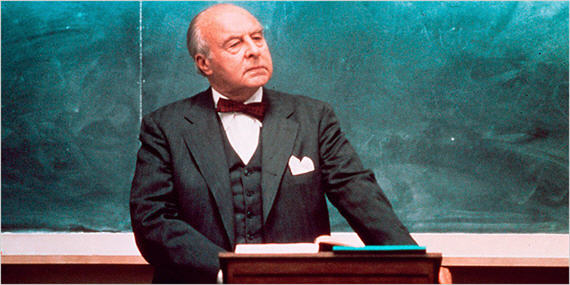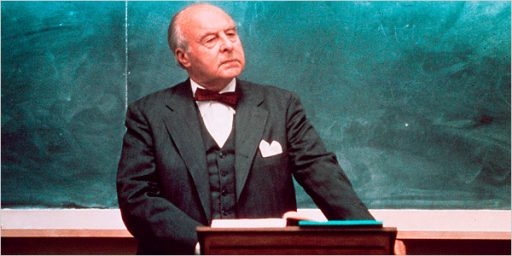Law School Grad Sues Alma Mater Because She Isn’t Working
One law school grad seems to think the solution to her employment problems is to sue her law school.
One recent law school graduate is attempting to put her newly learned litigation skills to work since she’s not, you know, actually working as a lawyer right now. The law student’s name is Anna Alaburda, and she’s suing Thomas Jefferson School Of Law in a class action law suit alleging that the school falsified its employment and placement data. There’s really no other way to put the argument that Alaburda makes other than to say that she basically accuses the law school of fraud:
The complaint in Alaburda v. TJSL contains counts for fraud, negligent misrepresentation, and violations of various California statutes (including laws against unfair business practices and false advertising). Plaintiff Anna Alaburda claims that she racked up more than $150,000 in student loans and can’t find decent legal employment, even though she graduated with honors from TJSL, passed the California bar exam, and sent more than 150 résumés to law firms. She now does document review on a project-by-project basis.
Alaburda’s lawsuit seeks compensatory damages “believed to be in excess of $50,000,000,” punitive damages, and injunctive relief, to stop TJSL from continuing its allegedly unlawful conduct. Alaburda seeks to represent a class consisting of “[a]ll persons who attended TJSL within the statutory period” — a group estimated to contain more than 2,300 individuals.
At least in its initial response, the law school seems rather incredulous about the whole thing:
Beth Kransberger, associate dean for student affairs at Thomas Jefferson, said that the school does not misrepresent its employment statistics.
“The school has always followed the guidelines established by the ABA. We’ve always been accurate in what we report, and we’ve always followed the system given to us by the ABA,” Kransberger said. “This lawsuit is very much about a larger debate. This is part of the debate about whether it’s practical to pursue a graduate degree in these difficult economic times.”
There has been a lot of discussion recently about the fact that law schools, graduate schools, and universities aren’t necessarily being honest with their students about prospective employment but, in the end, the decision of whether or not to go to law school is one that the student makes, and they have a responsibility to go into it with open eyes, as I put it some months ago:
There are many good reasons for becoming a lawyer, but thinking you’re going to end up with a glamorous job making big bucks and handling important cases isn’t one of them. Odds are, you’re either going to spend many, many years in a law library doing research for someone else, or you’re going to be working in the nitty-gritty of a small to medium sized firm where there are no glamorous cases and little reason to think you’ll be driving that BMW by the time you’re 28. If you can live with that, and only if you can live with that, then go to law school.
Or, perhaps you could just watch this video:







Incomes in the practice of law occur in a bimodal distribution. In the upper curve of the distribution are graduates of the top 15 law schools, editors of law review. Median income for that part of the distirbution is quite high. The lower curve of the distribution consists of everybody else. Median income for that part of the distribution is quite low—something like $30,000. The overall median (something like $80,000) is utterly meaningless.
That’s been true for a long time. What’s new is that a) law school tuitions are unconscionably high (as are all tuitions) and b) the big law firms (the ones that hire grads from the top 15 law schools and the editors of law review) have realized they don’t need battalions of associates any more.
Presumably, the basis of the suit depends on whether the school actively misrepresented the prospects for its graduates. I suspect that silence about those prospects won’t be enough.
Just goes to prove my theory that lawyers are the one group of workers where an excess supply raises the cost to society. With other jobs and professions, more supply of workers, means lower cost of hiring or services. But lawyers have to find a way to make money and trying every hair brain legal theory against whoever hits their radar is how they do it. Even if they don’t win, they cost productive society money better spent expanding and producing jobs. Oddly, they do create income for other lawyers, I wonder if there is a kickback system.
A double-edged sword for the school though. If she prevails, they can boast they create graduates that can out lawyer their professors. If she loses, it could reveal, let’s say, gaps, in their program.
She’s just following in her more elite colleagues’ footsteps. See:
http://www.nakedcapitalism.com/2011/06/banker-derangement-syndrome-i-lawyers-offer-to-get-rid-of-their-profession-to-save-the-tarp-banks.html
for some examples.
The nuts-and-bolts of civil procedure are pretty much not taught in law school anyway; if Ms. Alaburda is in pro per, then the usual adage about lawyers representing themselves in court would apply.
It’s also helpful to RTFA before opining about the merits of the suit and lawyers as a drag on the economy:
Policing against fraud is a good thing for the economy, not a detriment to it. The alternative is that we say “caveat emptor” to everything and it becomes impossible to form contracts intelligently in a complex commercial environment. That’s not to say that she’ll win. There are problems with her suit that should leap out at you upon reflection even if you aren’t a fanatic Ayn Rand disciple. But it doesn’t look like a “laugh it out of court” kind of complaint to me. And the big issue raised by the law school dean is an important issue that needs serious consideration.
Law schools claiming waitresses and bartenders in their employment statistics is a big problem that has been around a while. My law school did the same exact thing, I found out later. This is not all that outrageous of the claim. The problem is being able to prove it.
Good news! Fewer ambulance chasers, fewer John Edwards, hopefully more politicians with business backgrounds. Maybe the lawyers will begin eating their own and thin out the population of blood suckers.
sounds like she went to law schoolfor all the wrong reasons and her bubble got busted,she played now she gotta pay life aint fair but it is what it is
Maybe she shouldn’t have gone to Thomas Jefferson School of Law? Even though I’m not one for US News and World Rankings, the fact is that law offices look for schools that are at least ranked by US News and World.
She should be blaming herself for not only going to a law school that is well, for lack of better words, a bargain bin school, and wanting to be a lawyer for all of the wrong reasons.